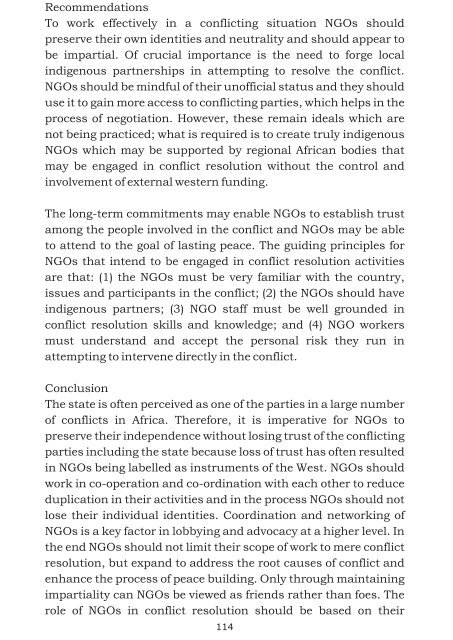Beneficiaries are actors too.pdf - Southern Institute of Peace ...
Beneficiaries are actors too.pdf - Southern Institute of Peace ...
Beneficiaries are actors too.pdf - Southern Institute of Peace ...
You also want an ePaper? Increase the reach of your titles
YUMPU automatically turns print PDFs into web optimized ePapers that Google loves.
Recommendations<br />
To work effectively in a conflicting situation NGOs should<br />
preserve their own identities and neutrality and should appear to<br />
be impartial. Of crucial importance is the need to forge local<br />
indigenous partnerships in attempting to resolve the conflict.<br />
NGOs should be mindful <strong>of</strong> their un<strong>of</strong>ficial status and they should<br />
use it to gain more access to conflicting parties, which helps in the<br />
process <strong>of</strong> negotiation. However, these remain ideals which <strong>are</strong><br />
not being practiced; what is required is to create truly indigenous<br />
NGOs which may be supported by regional African bodies that<br />
may be engaged in conflict resolution without the control and<br />
involvement <strong>of</strong> external western funding.<br />
The long-term commitments may enable NGOs to establish trust<br />
among the people involved in the conflict and NGOs may be able<br />
to attend to the goal <strong>of</strong> lasting peace. The guiding principles for<br />
NGOs that intend to be engaged in conflict resolution activities<br />
<strong>are</strong> that: (1) the NGOs must be very familiar with the country,<br />
issues and participants in the conflict; (2) the NGOs should have<br />
indigenous partners; (3) NGO staff must be well grounded in<br />
conflict resolution skills and knowledge; and (4) NGO workers<br />
must understand and accept the personal risk they run in<br />
attempting to intervene directly in the conflict.<br />
Conclusion<br />
The state is <strong>of</strong>ten perceived as one <strong>of</strong> the parties in a large number<br />
<strong>of</strong> conflicts in Africa. Therefore, it is imperative for NGOs to<br />
preserve their independence without losing trust <strong>of</strong> the conflicting<br />
parties including the state because loss <strong>of</strong> trust has <strong>of</strong>ten resulted<br />
in NGOs being labelled as instruments <strong>of</strong> the West. NGOs should<br />
work in co-operation and co-ordination with each other to reduce<br />
duplication in their activities and in the process NGOs should not<br />
lose their individual identities. Coordination and networking <strong>of</strong><br />
NGOs is a key factor in lobbying and advocacy at a higher level. In<br />
the end NGOs should not limit their scope <strong>of</strong> work to mere conflict<br />
resolution, but expand to address the root causes <strong>of</strong> conflict and<br />
enhance the process <strong>of</strong> peace building. Only through maintaining<br />
impartiality can NGOs be viewed as friends rather than foes. The<br />
role <strong>of</strong> NGOs in conflict resolution should be based on their<br />
114


